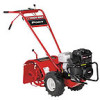Troy-Bilt Pony CRT Operation Manual - Page 21
Off-Season Storage
 |
View all Troy-Bilt Pony CRT manuals
Add to My Manuals
Save this manual to your list of manuals |
Page 21 highlights
1. Before adjusting the belt, shut off the engine, allow the Off-Season Storage engine and muffler to cool down, disconnect the spark plug wire and remove the ignition key on electric start models. When the tiller won't be used for extended periods, prepare it for 2. Remove the two lock nuts and remove the belt cover. See storage as follows: Fig. 6-8. 1. Clean the tiller and engine. 2. Do routine tiller lubrication and check for loose parts and hardware. 3. Protect the engine and perform the recommended engine maintenance by following the engine storage instructions found in the separate Engine Operator's Manual. NOTE: Be sure to protect the fuel lines, carburetor and fuel tank from gum deposits by removing fuel or by treating fuel with a fuel stabilizer. Follow the engine manufacturer's recommendations. 4. Fully Charge the battery. The battery loses some of its charge each day. Lock Nuts NOTE: Never store the battery without a full charge. Recharge the battery before returning to service. When storing the tiller for extended periods, disconnect the battery cables. Removing the battery from the machine is recommended. 5. Store the tiller in a clean, dry area. 6. Never store the tiller with fuel in the fuel tank in an Figure 6-8 enclosed area where gas fumes could reach an open flame or spark, or where ignition sources are present (space 3. Reverse belt tension adjustments are done with the heaters, hot water heaters, furnaces, etc.). reverse clutch cable adjuster located on the left side of the machine near the engine. See Fig. 6-9. Use two 1⁄2" open-end wrenches to loosen the two adjuster jam nuts a few turns. Reverse Clutch Cable Adjuster Adjuster Jam Nuts Figure 6-9 4. Move the cable adjuster away from the pulleys to increase the belt tension. 5. Tighten both jam nuts securely. 6. Reinstall the belt cover. 7. Move the tiller to an open area and test the reverse operation. Repeat this procedure if the machine does not respond when the reverse clutch is engaged. Section 6 - Maintenance & Adjustments 21















